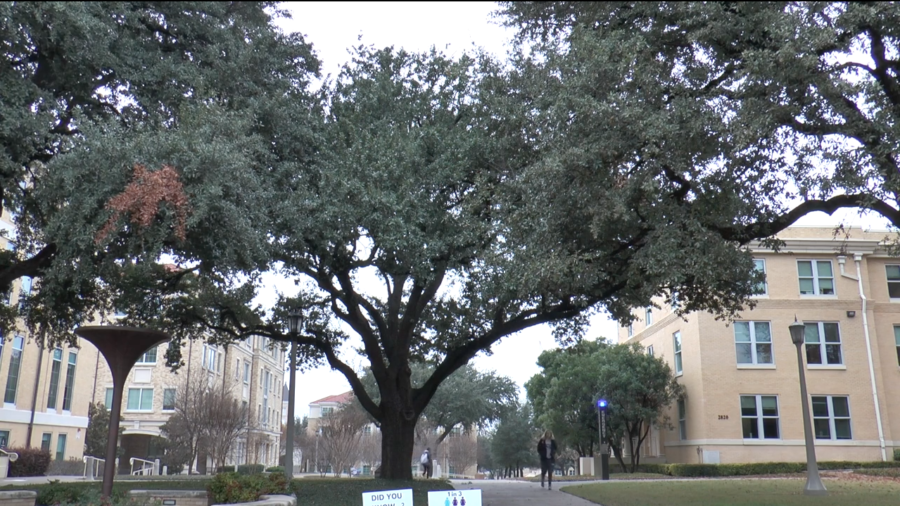The committee is looking to broaden its reach on campus by bringing more awareness to their efforts. “So many things have been done in the background to make it a very efficient campus that we don’t advertise it very well,” said Chris Honkomp, assistant vice chancellor for facilities. According to Honkomp, the most significant factor of the improvements in sustainability is investments in new construction. Twenty-three buildings on campus are LEED certified, which is the most widely-used certification for green buildings in the world. “Even though the building is more expensive to build in the first place, over the 30 to 50 years of life, we expect to get out of it,” Honkomp said. “It uses less energy, less water than a cheaper building would.” Another current focus for the physical plant is water conservation. “We get questions and one of those is, ‘Why do waste all this water on landscaping?’ and that’s a valid question to ask,” Honkomp said. The plant has implemented an irrigation system that controls the amount of water used based on factors like the amount of rainfall, the type of vegetation planted and humidity in the air. “When we looked at our water usage for September and October of this year, irrigation was way down because we got plenty of natural rainfall,” he said. The average use of water consumption on college campuses is 20 gallons per person per day, but in the TCU dorms, about 16 gallons per person per day are used, Honkomp said. “I don’t know if its because we have low flow shower heads, or because people aren’t doing the things that maybe earlier generations did,” he said. The current generation of TCU students is mostly unaware of all of these initiatives. Dr. Wendy Macias, a professor of strategic communication at TCU, has been involved in the university’s sustainability committee since its start three years ago. The sustainability committee began studying sustainability on campus and noticed that “communication was an area that just really needed some work,” Macias said. This lack of communication caused Macias to reach out to the student-run advertising and public relations firm on campus, ROXO. “Bigger, Bolder, Better” ROXO students rebranded TCU Sustainability from TCU Recycling this past semester. Among their various efforts to increase the visibility of sustainability on campus was their push week. Over the week, ROXO students collected over 1,000 plastic bags and their promotional Snapchat filter was viewed over 6,700 times.
“We wanted to go bigger, bolder, better,” said Violet Herzfeld, account executive for sustainability at ROXO. [envira-gallery id=”1217190″] Student involvement has increased in the committee this past semester, said Macias. The committee now has students from ROXO, SGA and the Neeley School of Business, along with faculty and staff members from various departments. “As more people hear about what we’re doing, they start working with the group,” said Macias. According to Macias, sustainability could turn into a factor that incoming students weigh in their decision to come to TCU. The Princeton Review ranked the top 50 green colleges based on survey data. TCU isn’t on the list, and it hasn’t earned the title of a “green college.” “If we were able to improve our practices, highlight what people know, I think that could become an attribute that helps to promote us, but currently I don’t know that we’re there yet,” she said. SGA representatives Nicole Gorretta and Joshua Witkop passed a bill that promoted a one, five and 10-year plan to help set TCU’s sustainability apart. HR-105-05-Sustainability Honkomp praised sustainability committee’s students’ efforts. “They’re really excited about and interested in getting the message out,” he said. Kaitlyn Kane, a junior strategic communication major, recognizes TCU’s efforts for sustainability. She said she remembers studying in her dorm room past midnight and having to move around to turn energy-efficient, timed lights back on. But she said she still recognizes the gaps in sustainability. “I think TCU tries to be environmentally conscious, but if you look around, you see a lot of trash cans and not recycling bins,” said Kane. Sustainability committee recognizes they have a long way to go. “If we were able to have a central office of sustainability, that would help with coordination,” said Macias. One of their long-term goals is to hire a full-time staff person solely committed to sustainability. For next semester, ROXO is hoping to put signs above trash and recycling bins showing what can and can’t go in each one. Honkomp said he thinks a lot of sustainability comes down to the individual. “I can use low-flow shower heads, but if you take a really long shower we’re going to lose that efficiency, so it is down, I think in many ways, to the personal choices people make,” said Honkomp. “We just need to make it easy for people to make the right decision.” For more information about how to contribute to sustainability committee, email chairwoman Becky Johnson at [email protected].







